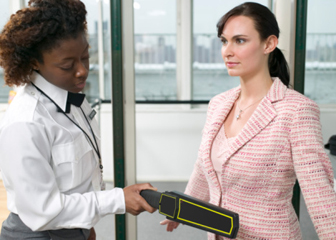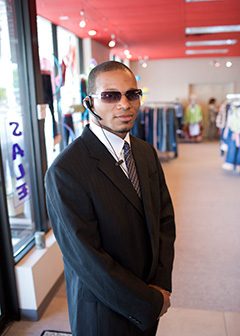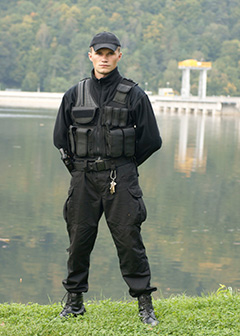What Security Guards and Gaming Surveillance Officers Do About this section

At many transportation facilities, guards and screeners use metal detectors to screen passengers.
Security guards and gaming surveillance officers patrol and inspect property against fire, theft, vandalism, terrorism, and illegal activity. They monitor people and buildings in an effort to prevent crime.
Duties
Security guards and gaming surveillance officers typically do the following:
- Protect and enforce laws on an employer’s property
- Monitor alarms and closed-circuit TV cameras
- Control access for employees, visitors, and outside contractors
- Conduct security checks over a specified area
- Write comprehensive reports outlining what they observed while on patrol
- Interview witnesses for later court testimony
- Detain criminal violators
Guards must remain alert, looking for anything out of the ordinary throughout their shift. In an emergency, guards may call for assistance from police, fire, or ambulance services. Some security guards may be armed.
A security guard’s job responsibilities vary from one employer to another. In retail stores, guards protect people, records, merchandise, money, and equipment. They may work with undercover store detectives to prevent theft by customers or employees, detain shoplifting suspects until the police arrive, or patrol parking lots.
In office buildings, banks, hotels, and hospitals, guards maintain order and protect the organization’s customers, staff, and property. Guards who work in museums or art galleries protect paintings and exhibits by watching people and inspecting packages entering and leaving the building. In factories, government buildings, and military bases, security guards protect information and products and check the credentials of people and vehicles entering and leaving the premises.
Guards working at universities, in parks, and at sports stadiums do crowd control, supervise parking and seating, and direct traffic. Security guards stationed at the entrance to bars and nightclubs keep under-age people from entering, collect cover charges at the door, and maintain order among customers.
Guards who work as transportation security screeners protect people, transportation equipment, and freight at airports, train stations, and other transportation facilities.
The following are examples of types of security guards and gaming surveillance officers:
Security guards, also called security officers, protect property, enforce laws on the property, deter criminal activity, and deal with other problems. Some guards are assigned a stationary position from which they may monitor alarms or surveillance cameras. Other guards may be assigned a patrol area where they conduct security checks.
Transportation security screeners, many of whom are Transportation Security Administration (TSA) officers, work at air, sea, and rail terminals and other transportation facilities, protecting people, freight, property, and equipment. They use metal detectors, x-ray machines, and other equipment to screen passengers and visitors for weapons and explosives, ensure that nothing is stolen while a vehicle is being loaded or unloaded, and watch for fires and criminals. Some officers work with dogs, which alert them to the presence of dangerous materials, such as bombs.
Armored car guards protect money and valuables during transit. They pick up money or other valuables from businesses and transport them to another location. These guards usually wear bulletproof vests and carry firearms, because transporting money between the truck and the business can be extremely hazardous.
Gaming surveillance officers, also known as surveillance agents and gaming investigators, act as security agents for casino employees, managers, and patrons. Using audio and video equipment in an observation room, they watch casino operations for irregular activities, such as cheating or theft, and monitor compliance with rules, regulations, and laws. They maintain and organize recordings from security cameras, which are sometimes used as evidence in police investigations. In addition, surveillance agents occasionally leave the observation room and walk the casino floor.








